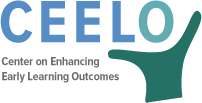
Using Assessment to Improve Teaching and Learning for Young Children Birth-3rd Grade
San Francisco, CA
June 5-6, 2013
The purpose of CEELO’s National RoundTAble is to provide early childhood specialists and their colleagues in State Education Agencies with research and best practice to improve states’ knowledge about and use of early childhood comprehensive assessment systems and teacher evaluation in the early years of the learning continuum. The meeting will provide opportunities for dialogue with peers and experts on critical policy issues impacting state policy and practice for young children birth through third grade.
DAY 1 – ASSURING TEACHER EVALUATION SYSTEMS ARE EFFECTIVE FOR EARLY LEARNING: how to fairly and reliably incorporate the early learning experiences and outcomes of children when measuring and promoting teaching success.
DAY 2 – FORMATIVE ASSESSMENT FOR CHILDREN BIRTH THROUGH THIRD GRADE: how to provide guidance to early learning staff in the use of assessment information to meet individual needs of children and improve practitioner/teacher practice and instruction.
Meeting Objectives:
- Provide professional development for state department of education early childhood managers on research-based best practices in early childhood teacher evaluation and formative child assessment.
- Enable state specialists to learn from each other about how different states are providing leadership to improve early childhood teacher evaluation and formative child assessment.
- Support each state in developing an action plan for leadership efforts to improve early childhood teacher evaluation and formative child assessment.
- Assist CEELO, CCSSO and NAECS-SDE to plan follow-up technical assistance to enhance state capacity on these issues.
Deborah Stipek is Professor in the Center for Education Policy Analysis, and former dean of Education at Stanford University.
Laura Bornfreund is senior policy analyst for New America;s Early Education Initiative where she contributes to pertinent studies and policies and researches and writes original policy papers.
Bridget K. Hamre is Research Associate Professor at the Curry School of Education and Associate Director of the Center for the Advanced Study of Teaching and Learning at the University of Virginia.
Lynn Holdheide is senior technical assistance consultant for the Center on Great Teachers and Leaders at AIR, specializing in evaluating teacher effectiveness.
James Lesko is Director of Early Development and Learning Resources at the Delaware Department of Education.
Catherine Scott-Little is Associate Professor, Human Development and Family Studies in the School of Human and Environmental Sciences at the University of North Carolina at Greensboro.
Gail Joseph is Associate Professor, Educational Psychology and Early Childhood and Family Studies at the University of Washington.
Shannon Riley-Ayers is Assistant Research Professor at the National Institute for Early Education Research where she conducts research on issues related to literacy, performanhttp://nieer.org/about/people/shannon-riley-ayerce-based assessment, and professional development.
Peter Mangione is Co-Director of WestEd’s Center for Child and Family Studies where he provides leadership in the development of comprehensive training resources and the evaluation of early childhood programs and services.
Kathleen Hebbeler is Manager of the Community Services and Strategies Program at SRI International where she provides leadership on systems and data efforts for young children with disabilities and their families.
Larry Schweinhart is the president of the HighScope Educational Research Foundation where he has conducted research and advised policy makers, educators, and advocates throughout the US and around the world.
Deborah Delisle is Assistant Secretary for Elementary and Secondary Education and serves as principal adviser to the U.S. Secretary of Education on all matters related to early learning and elementary and secondary education.
PRELIMINARY MATERIALS
- DOWNLOAD THE FINAL AGENDA
- DOWNLOAD THE ACTION PLANNING TOOL
- SEE THE PARTICIPANTS LIST
- ADDENDUM TO PARTICIPANTS LIST
PRELIMINARY READINGS
Teacher Evaluation
- An Ocean of Unknowns in Using Student Achievement Data to Evaluate Early Grade Teachers by Laura Bornfreund from the New America Foundation
- The Practical Guide to Teacher Evaluation – Online and PDF Versions from the Center on Great Teachers and Leaders
Formative Assessment
- Connecting Formative Assessment Research to Practice: An Introductory Guide for Educators from Learning Point Associates
- Using Formative Assessment to Improve Student Achievement in the Core Content Areas from the Southeast Comprehensive Center at SEDL
U.S. Secretary of Education Arne Duncan congratulates CEELO and NAECS-SDE
Assessment to Improve Student Outcomes – Deborah Stipek, Stanford University
An Ocean of Unknowns: The Risks and Opportunities in Using Student Achievement Data to Evaluate PreK-3rd Grade Teachers – Laura Bornfreund, Early Education Initiative
Early Childhood Teacher Evaluation: Challenges and Opportunities Using Observational Measures – Bridget Hamre, Center for Advanced Study of Teaching and Learning, University of Virginia
Inclusive Design: Building Teacher Evaluation Systems That Support All Teachers and Context – Lynn Holdheide, Center on Great Teachers & Leaders, American Institutes for Research
Assessment and Young Children with Disabilities – Kathy Hebbeler, SRI International
Using Assessment to Improve Teaching & Learning for Young Children, Birth-3rd Grade: Formative Assessment in Context – Peter Mangione, WestEd
An Ocean of Unknowns in Using Student Achievement Data to Evaluate Early Grade Teachers by Laura Bornfreund from the New America Foundation
The Practical Guide to Teacher Evaluation – Online and PDF Versions from the Center on Great Teachers and Leaders
Delaware’s General Evaluation Information using Student Measures
Delaware’s Approved External Measures
Guide to Evaluation Products database from the Center on Great Teachers and Leaders
State by State Database on Evaluation Policies: State Teacher and Principal Evaluation Policy Database
Coursera: offers PD online through MOOC (Massive Open Online Course). UVA offers Effective Classroom Interactions: Supporting Young Children’s Development class online with a research base on its effectiveness.
Measures of Effective Teaching Project: Ensuring Fair and Reliable Measures of Effective Teaching Culminating Findings from the MET Project’s Three-Year Study.
Charlotte Danielson Framework for Teaching.
Robert Pianta. Teaching Children Well: New Evidence-Based Approaches to Teacher Professional Development and Training. From the Center for American Progress.
